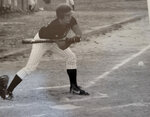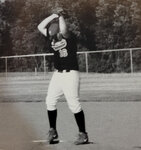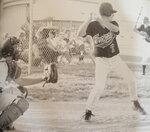This year’s Community R-6 Final Four baseball team seemed like a once-in-a-lifetime phenomena.
But what happened 22 years ago proves that history has a chance to repeat.
After …
This item is available in full to subscribers.
We have recently launched a new and improved website. To continue reading, you will need to either log into your subscriber account, or purchase a new subscription.
If you are a digital subscriber with an active subscription, or you are a print subscriber who had access to our previous website, then you already have an account here. Just reset your password if you have not yet logged in to your account on this new site.
If you are a current print subscriber and did not have a user account on our previous website, you can set up a free website account by clicking here.
Otherwise, click here to view your options for subscribing.
Please log in to continue |





This year’s Community R-6 Final Four baseball team seemed like a once-in-a-lifetime phenomena.
But what happened 22 years ago proves that history has a chance to repeat.
After this year’s Trojans secured their trip to the Final Four and secured their status as one of the best teams in Class 1, fans might have realized that this was Community baseball’s second trip to the Final as the 2001 Trojans did the same thing under the leadership of coach Jim Brink.
“I love Community R-6,” Brink said. “Of the five schools I’ve coached and taught at, it holds a special place in my heart. I don’t know these kids on this 2023 team, but I had their parents in school. They were great so I know they raised some pretty great kids.”
In his coaching career, Brink has led three teams to the Final Four — a Laquey team in 1985, a 1987 team in Colorado and the 2001 Trojans when he continued his Missouri coaching career. Brink spent 21 years at Community starting in 1990, spending 13 years as a basketball and baseball coach.
Recently, Brink has put in time on the diamond as an umpire, which has led him to cross paths with his former school. He recalls umpiring four Trojan games — three in the spring and one in the fall season — and officiating three games from behind the plate. That gave Brink the best seat in the house for the Trojans two horses on the mound this year: Gavin Allen and Mason Carroll.
“They both had pretty good curveballs,” Brink said. “When you’re behind the plate umpiring, you can see that good curveball pretty easily. This is why I thought like a month and a half ago the last time I had Community umpiring them, I mentioned to one of their fans that I felt like they could make some noise in postseason because they had pretty good strong pitchers. The question for me was going to be, ‘Could they get through their district tournament and beyond with their offense?’”
The Trojans, especially during their eight-game winning streak that led to them matching the 2001’s program-best record of 19-7, answered Brink’s question as big hits were coming from every part of Community’s lineup to support the stingy pitching by Allen and Carroll.
Brink said Allen and Carroll are both “big and strong” and are able to throw several different pitches well. He was impressed with each of their deliveries, but he said Carroll’s fundamentally sound delivery caught his eye whenever he was calling the balls and strikes for them.
In 2001, Brink was in a much different role as head coach when the Trojans had another towering duo in Scott Schutte and Matt Cope taking turns twisting opposing lineups into knots. The 6-foot-1 Schutte and 6-foot-3 Cope were all-state players and part of the trend Brink said he had with any team that advanced that far in that each featured at least two strong pitchers.
“I was blessed with some pretty good athletes at my time at Community R-6,” Brink said. “As far as baseball, a lot of these boys started for me when they were freshmen and for sure when they were sophomores. By the time they were juniors and they made it to the state tournament, I had some kids that had a lot of experience on the baseball field.”
This was the case for Schutte and Cope as core pieces on the pitching staff and in the lineup in 2001 that made Brink confident the Trojans could make a deep run, and the same was true for Allen and Carroll in 2023 as Allen and Carroll hit No. 3 and No. 4 in the order like Scutte and Cope.
However, it obviously takes more than two to form a strong team as the 2001 team had various players in the program multiple years like this year’s team. Two players for this year’s Trojans were brothers by blood along with being brothers by dirt as Pacey and Brant Cope were starters and cornerstones at the infield corners. Those two share blood and kicked up dirt as a Trojan like their uncle and 2001 star pitcher Matt, who is the brother of their father Aaron.
“When I was playing, I never had nerves that bad,” Cope said. “Watching my nephews play, it is a whole lot more nerve-wracking.”
Witnessing this year’s Trojans make their run was “way cooler” for Cope as it was special for him to see his nephews “walk the same road” he and his teammates did 22 years ago. Unfortunately, the comparison includes falling short of a state title as the 2001 team finished as co-third-place finishers.
“Both of them were a little bit upset,” Cope said. “You’re always going to be upset if you’re not the last team standing. I told them, ‘It means quite a bit to actually get there.’ You don’t realize until later on, whether it’s Lady Luck and few hops go your way or whatever it is, it’s a big thing to actually make it to the Final Four. We’ve had some pretty stellar athletes come through there (at Community R-6), and they don’t even make it out of districts.”
Cope said it was nice to see his nephews have the chance to play a full seven innings in each game even if they resulted in the Trojans being shut out. In 2001, he and Brink said the Trojans responded with two runs in the top of fifth inning against St. Vincent of their semifinal game before a thunderstorm rolled in to delay the contest for three and a half hours before it was called in favor of St. Vincent. MSHSAA officials at the Final Four that was hosted at Simmons Field at the University of Missouri in Columbia at that time ruled no third-place games would be played the next day due to field conditions.
Brink said games were called in favor of the home team in those days if the home team was ahead after four and a half innings — as compared to those same situations today turning into a suspended game that would be finished later. He said he still isn’t sure why the third-place games weren’t played, but Brink and Cope are both sure that Community R-6 has been given notoriety again because of the hard work of the players.
“Congratulations to the team this year,” Cope said. What the boys did, putting the school back on the map again, was big more than anything.”
Cope said he couldn’t help but draw comparisons between the tandems of him and his power pitching partner Schutte and this year’s two-headed monster Allen and Carroll.
When it comes to Cope and Schutte, Brink remembers they both had “dominant fastballs” and “pretty decent curveballs” that regularly went deep into games, not unlike Allen and Carroll. Cope said that was just the expectation for Class 1 baseball.
“When you’re in 1A and you’re one of the two guys, you have to know every other game you probably have to lock it in,” Cope said. “Our team there, we had to lock it in and make it through at least five innings. There was no choice.”
On any given night, Cope said the team’s No. 1 in Schutte, who was named the team’s MVP that season, had a better curveball and pickoff move while he as the No. 2 brought a quicker fastball. Even when a pitcher has a bevy of good pitches to use, Cope said that unfortunately doesn’t mean it is at its best all the time.
There were nights Cope said he didn’t have as much of a “tail” on his fastball, or wasn’t able to rely on movement as much, so he needed to work off the corners of the strike zone. He said that happens to every pitcher, including Schutte but also the modern Trojans like Allen during Community’s first sectional game near Kansas City against Northland Christian.
Cope jokes the game was the time where his brother, Aaron, “almost wore out” a cooler handle standing and sitting down “probably 60 times in an inning,” which made Cope “start sweating back there just watching him,” but it is a game Allen admitted to not having his best stuff after a three-hour bus ride. In those situations, Cope echoed what Allen said he needed to do to help the Trojans advance and that’s battle.
“You wanted to give your team a chance to be in it at the end of the game,” Cope said. “If you weren’t bringing the right pitches that night, you were going to put yourself in a bad place.”
Allen and Carroll were able to bring the power to the offense on a regular basis, combining for seven home runs as part of their collective 21 extra-base hits. Schutte and Cope did their fair share of damage as Cope said Schutte had several home runs that year and Brink recalls Cope having about 8-10 long balls.
“My two predominant hitters were probably Schutte and Cope,” Brink said. “Those were my 3 and 4 hitters – Schutte being my third and Cope being my fourth. They both hit for power.”
The damage dealt by the Trojans in 2001 wasn’t just limited to those two hitters or through one method as Brink said Community had power up and down the lineup as well as speed it used for an aggressive approach on the bases. Brink said this year’s Trojans did a great job of advancing runners through the use of bunting and taking the extra base to make it to the Final Four.
Brink said his 2001 team took whatever base they could at any given time, but Cope said the number of Trojans capable of this were more than four. Starting at the top of the order was leadoff all-state hitter Bryan Stuckenscheider that brought a ton of speed, as Brink remembers.
“If he got on base, usually something would happen,” Brink said. “Usually, we tried to steal a base immediately to get him in scoring position for those other two guys (Schutte and Cope).”
Cope said he was nowhere close to a speed guy as he recalls having two knee surgeries before the end of high school, which eliminated him as a catcher, so he jokingly said he “developed a head-first slide for a fat boy that would not hurt my knee anymore after that.” But, the 180-190-pound Schutte was able to move well, Cope said, as were all-district players Louis Converse and Josh Deimeke, Wesley Hahn and the 6-foot-5 Dustin Zumbehl, who had “hellacious speed” despite his frame.
“It was putting pressure on the pitcher more than anything,” Cope said. “If there was much of a bobble, a lot of those guys were taking extra bases. Taking forceouts away and not letting them go to any easy bags was big on getting runs on the board.”
The pressure on the Trojans wasn’t so bad that year as Brink said the district title that season was the fifth for the program at the time and the basketball teams he led from 2000-02 all won district titles as well. Brink said Community baseball was the No. 1 seed in its district tournament that year so the talent was definitely there.
Still, Cope said any pressure that was there was completely off after the Trojans won districts as he felt they were playing with “house money” after that, which was similar to current head coach Joel Krato’s feelings after Community clinched their first district title in 22 years.
Since much of that 2001 baseball team also played for Brink on the hardwood, the former coach said the memory of a one-point overtime loss in a state quarterfinal at Hannibal was in his players’ memories still so they also had motivation to advance past the quarterfinals in baseball.
When this year’s team had that same strong belief, the results reminded Brink of his favorite memories from his coaching days.
“At that quarterfinal game at Community R-6, it was a lot of fun to watch those kids celebrate when they won that game because they were going to state,” Brink said. “The same thing I miss about coaching the most was seeing the kids celebrate after they won a district championship. And they keep winning to get to the Final Four.”
For Cope, it meant much for him and his 2001 teammates to celebrate together as much as he’s sure it meant for this year’s team. Leading up to that point, he said the 2001 Trojans displayed much selflessness like having Dusty Horton be the catcher despite not catching at all previously and having players play several positions like the 6-foot-3 Daniel Hodges — who was one of Trojans’ better outside shooters in basketball — that spent time at first base and in the outfield.
“Coach made a position change (at catcher) because he thought it would be better for the team,” Cope said. “There was a lot of unselfish work like that. That’s what it meant (to everybody).”
The selflessness doesn’t just encompass the team as Brink and Cope said the community means much to the program and vice versa. At home games this season, a past Trojan athlete would throw out the first pitch prior to a game.
There are several parallels in the program’s two Final Four seasons, but there are also points that intersect or perhaps where things come full circle.
“One unusual thing about this year’s team, and one reason I really wanted to make it a point to go to the state tournament, is some of the kids that were on this team this year, I had actually coached or taught their parents in school,” Brink said. “It was fun to see them be successful.”